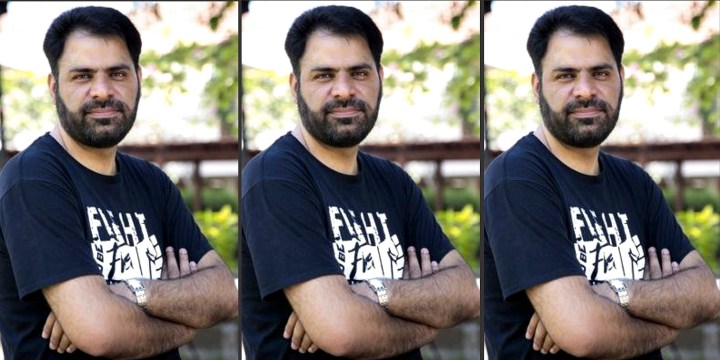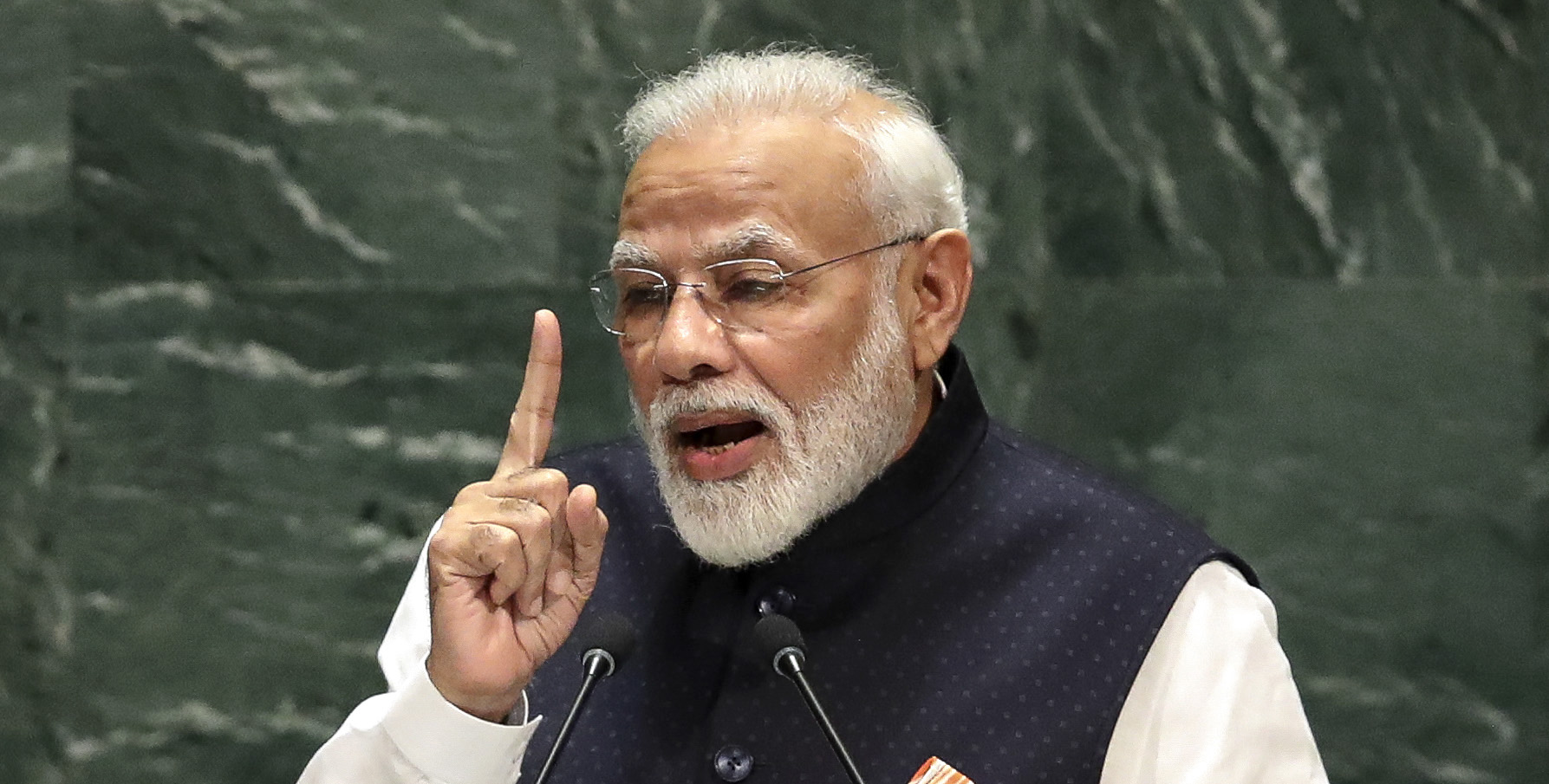Witness to Kashmir Op-ed
Silenced: Respected human rights defender Khurram Parvez detained by Modi government

On 22 November, in Kashmir, globally renowned human rights defender Khurram Parvez was detained by India’s National Investigation Agency. Kashmir, site of an intense stand-off between India and Pakistan, is one of the most heavily militarised zones in the world. Khurram and his organisation, the Jammu Kashmir Coalition of Civil Society, have repeatedly documented and exposed the violent impunity of security forces, speaking up on behalf of victims and their families.
Khurram Parvez (44) is a human rights defender based in Kashmir. He is the programme coordinator and one of the founders of the Jammu Kashmir Coalition of Civil Society (JKCCS), an amalgam of non-funded, non-profit campaign, research and advocacy organisations in Kashmir. He is the chairperson of the Asian Federation Against Involuntary Disappearances (AFAD).
The crucial human rights work that Khurram has done over the decades makes him a leading global human rights defender. He has widely travelled to understand and work on enforced disappearances in Kashmir, Sri Lanka, Pakistan and the Philippines – testimony to his important interventions through regional and international campaigns to hold states accountable and not just restrict his work to his native place.
Under his capable leadership, AFAD was awarded Asia’s top human rights award in 2016. The Asia Democracy and Human Rights Award recognised the “indelible contributions” by AFAD in pushing states to address the rights of families of the disappeared and seeking justice.
JKCCS and Khurram have been engaged in unparalleled work in Kashmir to extensively document human rights violations including mass and unmarked graves, enforced disappearances, torture, killings, sexual violence and communications shutdowns. Some of JKCCS’ crucial works include Buried Evidence, Alleged Perpetrators, Structures of Violence, Torture, Kashmir’s Internet Siege. Khurram is widely revered for his ability to hold scholarly discussions and provide critical insights on varied aspects of human rights, training student interns and bringing forth timely issue-specific reports as well as annual and biannual reviews of human rights in the region.
Khurram’s work spans more than two decades, starting with his university days in the late Nineties in Kashmir when he started a peer-counselling helpline for students affected by the armed conflict in the region. He took a keen interest in the work of the Association of Parents of Disappeared Persons (APDP) and subsequently went on to play a crucial role in the formation of JKCCS in 2000. The organisation has produced incisive reports that map the state of human rights in Kashmir and confront the state for its poor record and lack of accountability.
During an election monitoring exercise with his colleagues in North Kashmir in 2004, he lost a leg after the vehicle they were travelling in was hit by a landmine blast. The incident only strengthened Khurram’s resolve to continue his work and he took keen interest in advocating for landmine removal regionally and globally. He was awarded the Reebok Human Rights Award in 2006.
In a reprisal for the work Khurram and JKCCS were doing in 2016 following a long period of civilian killings, he was stopped from travelling to Geneva to attend a session of the UN Human Rights Council. He was arrested from his residence the next day and booked under the Public Safety Act, a draconian preventive detention law that allows for detention without trial for two years. He was released after 76 days.

Indian Prime Minister Narendra Modi, whose government detained respected human rights defender Khurram Parvez. (Photo: Drew Angerer/Getty Images)
Khurram’s residence and office were raided in October 2020 by the National Investigation Agency (NIA) when the organisation, alongside others, was accused of raising funds to carry out secessionist activities in Kashmir. The current set of actions needs to be seen on a continuum as part of the state’s policy of curbing dissent, enforcing censorship and preventing documentation of human rights violations in the region, as well as specifically targeting Khurram for his crucial work.
About the arrest
At about 7.45am on 22 November, NIA personnel raided Khurram’s residence in Sonwar, Srinagar. The raid lasted six hours after which the NIA took Khurram to their camp at Church Lane, Srinagar, for routine questioning. The agency also seized his electronic devices, his wife’s phone and some books from his study.
While the family had been assured that he would be allowed to return home later, his brother received a call at 5.55pm informing the family to bring Khurram’s clothes to the NIA office. There, they were handed his arrest memo and informed that he would be flown to New Delhi. He was subsequently produced in a court in Delhi and sent to remand until 29 November. His children, aged three and 11, his wife and his mother were able to meet him before he was taken to Delhi.
While Khurram’s residence was being raided a 14-hour raid was carried out at his JKCCS office in Amira Kadal, Srinagar. Personnel of the Central Reserve Police Force and Jammu Kashmir Police accompanying NIA sleuths were seen blocking the road leading to the office. News reports claimed that all files were “thoroughly” searched.
The preposterous and fabricated charges under which Khurram has been booked include sections 120B (criminal conspiracy), 121 (waging war against the state) and 121A (conspiracy to commit offences punishable under Section 121) of the Indian Penal Code, 186; and sections 17 (raising funds for terrorist act), 18 (conspiracy), 18B (recruiting of any person or persons for terrorist act), 38 (offence relating to membership of a terrorist organisation), and 40 (raising funds for a terrorist organisation) of the Unlawful Activities (Prevention) Act (UAPA), 1967.
UAPA is a stringent law that has long been decried by activists, for its very nomenclature allows it to be misused by the state to curb dissent and any questions on accountability. Invoking an anti-terror law against a dogged defender of human rights deserves condemnation and demands urgent response from states, organisations and individuals committed to democratic norms and free expression. DM/MC
The author’s name is withheld for their protection.
This account of Khurram Parvez’s arrest and the work that the Indian government seems anxious to silence has been released by the Asian Federation Against Involuntary Disappearances (AFAD). Since it was written Parvez has been moved to a jail in New Delhi. Parvez’s arrest has been condemned by the Office of the UN Commissioner for Human Rights. It is the latest in a series of arrests and lengthy imprisonment of human rights activists by the government of Indian Prime Minister Narendra Modi. Some of these activists have died in detention, including 84-year-old priest Stan Swamy in July 2021.
[hearken id=”daily-maverick/8881″]





















 Become an Insider
Become an Insider
Comments - Please login in order to comment.